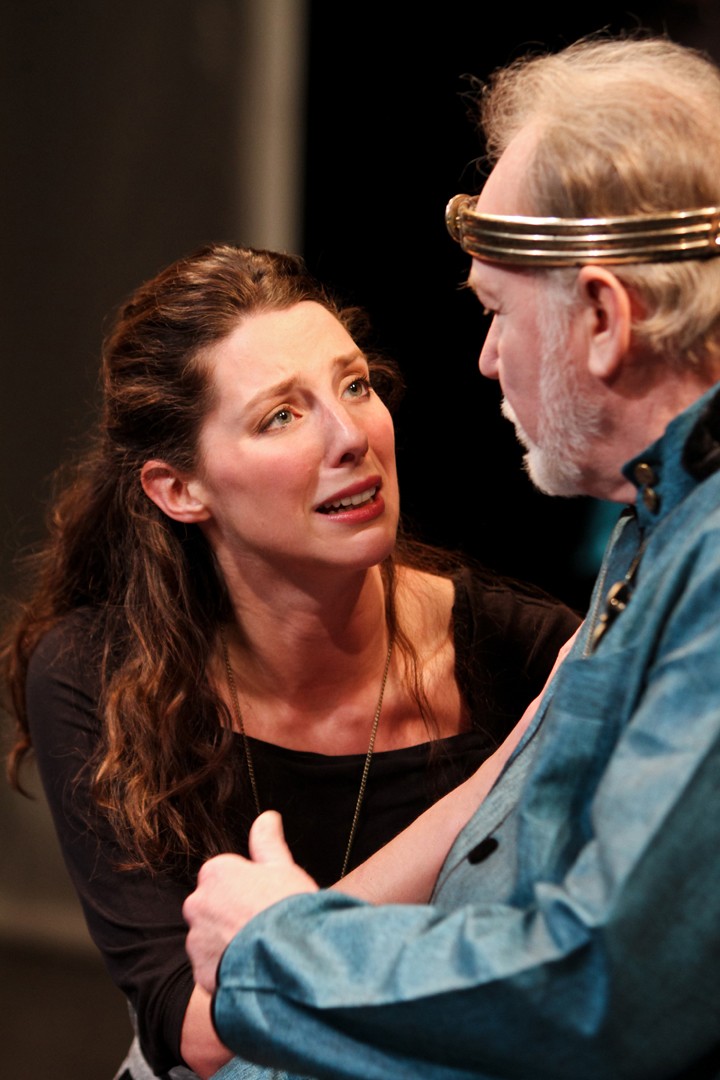Opening Nights
King Lear
Cornish Playhouse at Seattle Center, 733-8222, seattleshakespeare.org. $25–$48. Runs Wed.–Sun. Ends May 17.
In this imagining of King Lear’s famous opening scene, in which the doomed monarch inventories the relative magnitudes of his three daughters’ love for him, he rocks a peacock-hued tunic coat. Relish the fleeting sight, as it is the only dash of vibrant color you will see before the last moments of this drab production. To pay for the conceptual gambit of stripping the king’s tinct along with his title, director Sheila Daniels and costumer Melanie Burgess tax the audience with a gloomy palette of black, white, gray, and beige on a similarly depleted set (designed by Daniels and Craig Wollam). Seattle Shakespeare Company’s fine acting is in ample evidence, but this overly cerebral take on a cathartic tale made me want to run outside and gasp for the saturated hues of messy real life.
Dan Kremer’s Lear, tall and sardonic, does more with the humorous and witty situations than with the tragic ones. This ruler seems most fully engaged when ridiculing others, while the windy heath—sound design by Rob Witmer—and other adversities hardly sway him. Beneath him, the characters soon sift into two camps: supporters of nefarious sisters Goneril (Linda K. Morris) and Regan (Debra Pralle); and supporters of Lear and exiled Cordelia (Elinor Gunn). Among the latter, Todd Jefferson Moore offers an endearingly earthy Fool, while Amy Thone’s deadpan staccato makes her Kent—here a woman disguised as a man—a glib cartoon. The most memorable performance, though, is from Eric Riedmann as evil Edmund, who narrates his intentions to the audience like a stand-up comedian and puts hilariously inappropriate moves on Regan and Goneril—as if they’re his S&M slaves.
O, would that the sad parts were this effective! After the three-hour investment, with two intermissions, we need Lear to carry dead Cordelia to us! Did Michelangelo have Mary simply stand and look at her dead son Jesus for his Pieta? Yet for some reason—a bad back, maybe?—Kremer pulls Cordelia in on a trolley cart, like luggage. I liked that form of locomotion during Daniels’ 2009 production of Abe Lincoln in Illinois at Intiman, where the president was affectingly scooted offstage into eternity on a castered podium. Here the device eases Lear’s burden but lessens the tragic impact. In compensation, Jessica Trundy’s lighting yields a slice of hopeful pink on the horizon. But Lear-sized agony should be served dripping raw, by hand. Margaret Friedman
PWho’s Afraid of Virginia Woolf?
Seattle Repertory Theatre, 155 Mercer St. (Seattle Center), 443-2222, seattlerep.org. $15–$80. Runs Wed.–Sun. Ends May 18.
It’s even odds whether more entrails were strewn on the floor of Rome’s Colosseum or in the den of George and Martha’s home. Either way, the bill of fare is blood sport as entertainment, and director Braden Abraham’s production takes Edward Albee’s circular firing-squad masterwork to Olympian heights and Stygian depths.
The 1962 play is a landmark stage dissection of the American family, in which Albee demonstrates how it’s possible to rip flesh from bone and finally destroy a person with nothing more than verbal skills, a few marital secrets, and the firm conviction that your opponent is beneath contempt. Martha (Pamela Reed) and George (R. Hamilton Wright) hold each other responsible for ruining their lives. She’s a university president’s daughter who’s taken to drink; he’s the academic who’s lacked sufficient drive or charisma to move up the campus career ladder. She calls him an unambitious eunuch. He calls her an emasculating harpy. You get the idea. Little remains of their onetime compatibility other than drinking and a sadistic game of trust. The question Albee keeps putting on the table is this: What will happen when I reveal your most closely guarded flaws to complete strangers? George and Martha are each daring the other to end their marriage—or raise the stakes with another toxic revelation. It’s a perverse game that can be played only if they remain in the same room, with campus couple Nick (Aaron Blakely) and Honey (Amy Hill) as their reluctant audience.
Watching Reed and Wright lay into each another for three hours (with two intermissions) resembles nothing so much as a bullfight where only two matadors show up. As Abraham strategically directs them, Reed and Wright teeter between sympathetic characters and utter churls, much to the bewilderment of their guests—who are always looking for but never finding a safe place to land. Eventually, though, Nick has his naive idealism peeled back to reveal nothing more than naked avarice, and Honey, first appearing vapid and needy, finally shows a dark, manipulative side. Both learn from their masters.
Albee’s play is an all-you-can-eat buffet for performers, and these veterans bring the necessary skill and gravitas. Matthew Smucker’s set is a winning hodgepodge of suburban detritus; but, truth be told, you could stage Who’s Afraid of Virginia Woolf? as a cage match inside a chain-link fence. Much of what you’ll see is horrifying, but it’s also completely irresistible. Kevin Phinney
E
stage@seattleweekly.com




